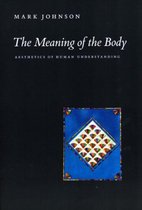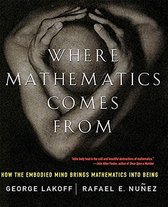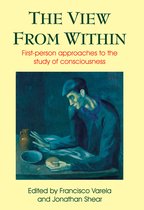Philosophy In The Flesh The Embodied Mind and Its Challenge to Western Thought
Afbeeldingen
Sla de afbeeldingen overArtikel vergelijken
- Engels
- Paperback
- 9780465056743
- 08 oktober 1999
- 640 pagina's
George Lakoff
(Bron: Wikipedia. Beschikbaar onder de licentie Creative Commons Naamsvermelding/Gelijk delen.)"
Samenvatting
What are human beings like? How is knowledge possible? What is truth? Where do moral values come from? Questions like these have stood at the centre of Western philosophy for centuries. In addressing them, philosophers have made certain fundamental assumptions,that we can know our own minds by introspection, that most of our thinking about the world is literal, and that reason is disembodied and universal,that are now called into question by well-established results of cognitive science. It has been shown empirically that:Most thought is unconscious. We have no direct conscious access to the mechanisms of thought and language. Our ideas go by too quickly and at too deep a level for us to observe them in any simple way.Abstract concepts are mostly metaphorical. Much of the subject matter of philosopy, such as the nature of time, morality, causation, the mind, and the self, relies heavily on basic metaphors derived from bodily experience. What is literal in our reasoning about such concepts is minimal and conceptually impoverished. All the richness comes from metaphor. For instance, we have two mutually incompatible metaphors for time, both of which represent it as movement through space: in one it is a flow past us and in the other a spatial dimension we move along.Mind is embodied. Thought requires a body,not in the trivial sense that you need a physical brain to think with, but in the profound sense that the very structure of our thoughts comes from the nature of the body. Nearly all of our unconscious metaphors are based on common bodily experiences.Most of the central themes of the Western philosophical tradition are called into question by these findings. The Cartesian person, with a mind wholly separate from the body, does not exist. The Kantian person, capable of moral action according to the dictates of a universal reason, does not exist. The phenomenological person, capable of knowing his or her mind entirely through introspection alone, does not exist. The utilitarian person, the Chomskian person, the poststructuralist person, the computational person, and the person defined by analytic philosopy all do not exist.Then what does?Lakoff and Johnson show that a philosopy responsible to the science of mind offers radically new and detailed understandings of what a person is. After first describing the philosophical stance that must follow from taking cognitive science seriously, they re-examine the basic concepts of the mind, time, causation, morality, and the self: then they rethink a host of philosophical traditions, from the classical Greeks through Kantian morality through modern analytic philosopy. They reveal the metaphorical structure underlying each mode of thought and show how the metaphysics of each theory flows from its metaphors. Finally, they take on two major issues of twentieth-century philosopy: how we conceive rationality, and how we conceive language. Philosopy in the Flesh reveals a radically new understanding of what it means to be human and calls for a thorough rethinking of the Western philosophical tradition. This is philosopy as it has never been seen before.
Productspecificaties
Inhoud
- Taal
- en
- Bindwijze
- Paperback
- Oorspronkelijke releasedatum
- 08 oktober 1999
- Aantal pagina's
- 640
- Illustraties
- Nee
Betrokkenen
- Hoofdauteur
- George Lakoff
- Tweede Auteur
- Mark Johnson
- Hoofduitgeverij
- Basic Books
Overige kenmerken
- Editie
- New edition
- Extra groot lettertype
- Nee
- Product breedte
- 185 mm
- Product hoogte
- 44 mm
- Product lengte
- 235 mm
- Studieboek
- Ja
- Verpakking breedte
- 192 mm
- Verpakking hoogte
- 47 mm
- Verpakking lengte
- 236 mm
- Verpakkingsgewicht
- 1104 g
EAN
- EAN
- 9780465056743
Je vindt dit artikel in
- Taal
- Engels
- Boek, ebook of luisterboek?
- Boek
- Beschikbaarheid
- Leverbaar
- Studieboek of algemeen
- Algemene boeken
Reviews
Negatief, positief, neutraal: we zetten een review altijd online. We controleren wel eerst of ’ie voldoet aan onze reviewvoorwaarden en niet nep is. We controleren ook of ’ie is geschreven door iemand die het artikel heeft gekocht via bol.com en zetten dit er dan bij. De controles gebeuren automatisch, al kijken er soms mensen mee. Bol.com betaalt niet voor reviews. Als een reviewer door een andere partij is vergoed, staat dit in de review zelf.
Negatief, positief, neutraal: we zetten een review altijd online. We controleren wel eerst of ’ie voldoet aan onze reviewvoorwaarden en niet nep is. We controleren ook of ’ie is geschreven door iemand die het artikel heeft gekocht via bol.com en zetten dit er dan bij. De controles gebeuren automatisch, al kijken er soms mensen mee. Bol.com betaalt niet voor reviews. Als een reviewer door een andere partij is vergoed, staat dit in de review zelf.
-
Is wat je ziet wat er is?
Positieve punten
- Overzichtelijk
- Praktisch toepasbaar
- Heldere boodschap
De auteurs leggen de basis bloot van onze perceptie. Ze beschrijven duidelijk de manier waarop we interpreteren wat we zien en beleven. Een aanrader voor wie denkt in termen van WYSIWYG (what you see is what you get). Niets is wat het lijkt en bovendien geven we zelf betekenis aan wat we waarnemen. Boeiende lectuur en terzelfdertijd heel bruikbaar in de dagelijkse praktijk.
Vond je dit een nuttige review?00 -
Great Thoughts
Positieve punten
- Overzichtelijk
- Volledig
Het boek is toegankelijk geschreven op een wetenschappelijke manier. De theorie is abstract maar interessante gedachten komen aanbod.
Vond je dit een nuttige review?00
Kies gewenste uitvoering
Prijsinformatie en bestellen
De prijs van dit product is 28 euro en 95 cent.- Prijs inclusief verzendkosten, verstuurd door bol
- Ophalen bij een bol afhaalpunt mogelijk
- 30 dagen bedenktijd en gratis retourneren
- Dag en nacht klantenservice
Vaak samen gekocht
Rapporteer dit artikel
Je wilt melding doen van illegale inhoud over dit artikel:
- Ik wil melding doen als klant
- Ik wil melding doen als autoriteit of trusted flagger
- Ik wil melding doen als partner
- Ik wil melding doen als merkhouder
Geen klant, autoriteit, trusted flagger, merkhouder of partner? Gebruik dan onderstaande link om melding te doen.








